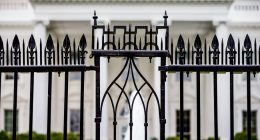
The U.S. officially climbed out of a recession in April 2020, concluding a pandemic-driven economic contraction that began in February and at two months was the shortest on record.
The announcement Monday from the National Bureau of Economic Research also marks April as the official start of the economic recovery from the initial shock of the coronavirus pandemic last spring, which triggered widespread business and school closures, a steep drop in demand for services and record job losses.
The recession ended the country’s longest recorded economic expansion, which began in June 2009 and lasted 128 months, according to the bureau’s Business Cycle Dating Committee, the accepted arbiter of recession dates in the U.S.
The committee uses a variety of indicators to identify the peaks and troughs that frame economic contractions, defining “recession” as a significant decline in economic activity spread across the economy that lasts more than a few months. The group typically waits until a business cycle is well under way before declaring it has started—it took more than a year to declare the end of the 2007-09 recession. But it broke with past practice last summer when it announced a recession had begun just a few months earlier.
The economy shrank at a 5% annual rate in the first quarter of 2020 and at a 31.4% pace in the second quarter, adjusted for inflation, the Commerce Department estimated. Then, output and jobs rebounded strongly in the second half of the year, with gross domestic product rising at a 33.4% annual rate in the third quarter and 4% pace in the fourth quarter.
Measured year-over-year, the economy contracted 3.5% in 2020, the largest decline since just after World War II, the Commerce Department reported. Measured from the fourth quarter of 2019 to the same quarter of 2020, the economy shrank 2.5%.
Fueled by Covid-19 vaccinations, economic reopenings and fiscal stimulus, the economy grew at a 6.4% seasonally adjusted annual rate in the first quarter of this year. Economists estimate it grew at an even faster rate in the second quarter—9.1% according to a Wall Street Journal survey. Economists also think growth peaked in the spring, but that a strong expansion is expected to continue into next year. Second-quarter GDP figures are set to be released by the Commerce Department on Thursday July 29.
While past recessions have affected the economy more uniformly, the most recent downturn and recovery can be characterized by its uneven outcomes, said Diane Swonk, chief economist at accounting and advisory firm Grant Thornton. While some industries quickly bounced back to pre-pandemic levels of activity and employment, others are still adjusting to an economic shift that hit demand for services, particularly in areas such as travel, entertainment, bars and restaurants.
Households increased spending on such services in May, helping position the economic recovery for a strong summer.
“It’s such a unique recession, it’s difficult to put it into the traditional boxes of what we think of: recovery, a trough in economic activity, and then a rebound,” said Ms. Swonk, speaking before the NBER’s announcement.
The Covid Recovery
More WSJ coverage of the U.S. economy post-coronavirus, selected by the editors.
Copyright ©2021 Dow Jones & Company, Inc. All Rights Reserved. 87990cbe856818d5eddac44c7b1cdeb8








